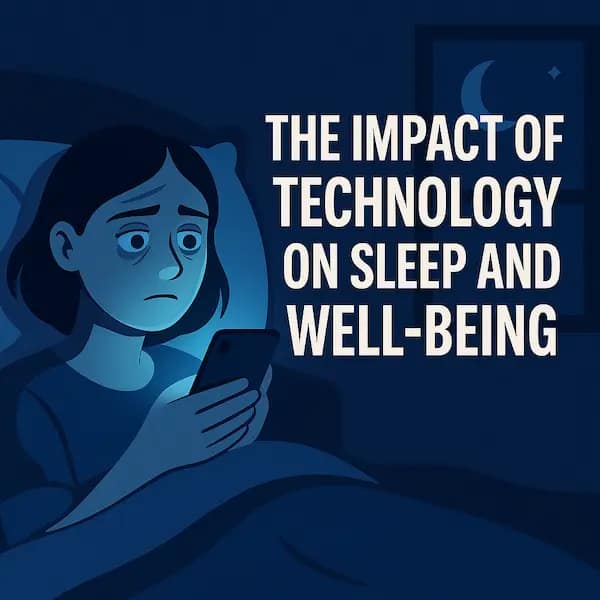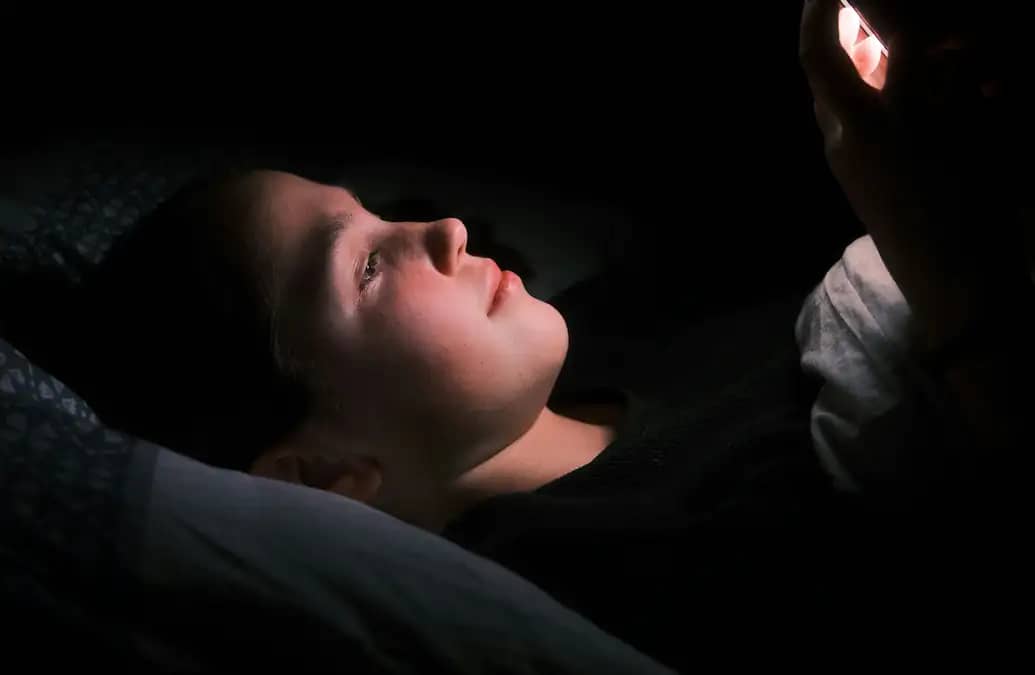The impact of technology on sleep is undeniable in today’s digital era, as our sleep patterns are deeply affected by our interactions with digital devices.
The blue light emitted by smartphones, tablets, and computers inhibits melatonin production—a hormone essential for sleep regulation. Additionally, the stimulating nature of digital content can prevent the brain from calming down before bed, further diminishing our well-being.
- Key Takeaways
- The Digital Age and Our Sleep Patterns
- 💡 You Might Also Like:
- How Technology Has Changed Our Bedtime Routines
- Stats on Screen Usage Before Bed
- How Technology Impacts Sleep Quality
- The Science Behind Sleep Disruption
- Circadian Rhythm Disruption in the Digital World
- How Screens Delay Falling Asleep
- Artificial Light’s Role in Sleep Quality
- Blue Light and Its Effects on Sleep
- Melatonin and Blue Light
- Devices That Emit the Most Blue Light
Key Takeaways
- Digital devices can negatively impact sleep quality.
- Blue light from screens suppresses melatonin production.
- Following a consistent bedtime routine supports better sleep.
- Limiting screen time before sleep improves sleep hygiene.
- A calm, dark, and tech-free environment enhances restful sleep.
Impact of Technology on Sleep
The impact of technology on sleep has become a growing concern in today’s hyper-connected world. With smartphones, tablets and laptops being used late into the night, our natural sleep rhythms are frequently disrupted. Blue light emitted from screens suppresses melatonin production — a hormone essential for sleep — making it harder to fall asleep and stay asleep. Furthermore, constant notifications and digital stimulation increase stress levels and keep the brain alert when it should be winding down. As screen time rises, especially before bed, understanding and managing technology’s influence is essential for maintaining healthy sleep patterns.
According to SleepFoundation.org, screen time before bed can reduce melatonin production.

👉 Related Read: Feeling overwhelmed by daily stress? Discover how mindfulness can help! Check out our guide —
Mindfulness Meditation: A Beginner’s Guide to Reducing Stress — and learn simple techniques to calm your mind and improve well-being.
The Digital Age and Our Sleep Patterns
With the explosion of smartphones and other digital devices, our sleep behaviors have transformed—often for the worse. Constant access to digital technology contributes to delayed sleep onset and interrupted sleep cycles, disrupting the quality of our rest.
💡 You Might Also Like:
| 🔑 Keyword | 🔗 Related Article |
|---|---|
| Healthy Smoothie Recipes for Breakfast | 5 Healthy Smoothie Recipes for Breakfast – Read More |
| Homemade Soup Recipes | Homemade Soup Recipes to Warm You Up – Read More |
| Low-Carb Vegetarian Diet Meal Plan | Low-Carb Vegetarian Diet: What to Eat, Avoid and a Sample Meal Plan – Read More |
How Technology Has Changed Our Bedtime Routines
While modern technology enhances convenience, it also introduces distractions that compromise sleep. Notifications, blue light emissions, and addictive digital content keep the brain active long after we should be winding down. Checking social media or emails in bed has become a nightly habit for many, leading to ongoing sleep disturbances and decreased overall health.
🛡️ Boost Your Body’s Defenses: Want to stay healthy year-round? Explore nature’s most powerful immune-boosting foods in our detailed guide —
Top 10 Superfoods for Boosting Immunity — and start adding them to your diet today!
Stats on Screen Usage Before Bed
According to the National Sleep Foundation, around 75% of adults use electronic devices within an hour before sleeping. Here’s how common different devices are:
| Device | Percentage of Users |
|---|---|
| Smartphone | 60% |
| Tablet | 20% |
| Laptop/Computer | 15% |
| Television | 30% |
This data shows just how common it is to use devices before sleep—and highlights the potential impact on our sleep quality.
How Technology Impacts Sleep Quality
To truly grasp how screens affect sleep, we need to understand their role in disrupting our internal body clock and restfulness. Frequent use of screens before bed is linked with insomnia, sleep fragmentation, and daytime fatigue.
The Science Behind Sleep Disruption
Blue light emitted by devices mimics daylight, tricking our brains into staying alert. This reduces melatonin production, delays sleep onset, and lowers the overall quality of sleep. Meanwhile, engaging content further stimulates the brain, making it difficult to relax and transition into deep sleep.
Circadian Rhythm Disruption in the Digital World
Our circadian rhythm is our natural sleep-wake cycle, guided by environmental light. Digital screens emit blue light that confuses our biological clock, signaling the brain to stay awake instead of preparing for sleep. This misalignment can lead to chronic sleep issues.
⚖️ Struggling to juggle work and personal life? Discover practical strategies to create harmony between your career and well-being in our helpful article —
How to Maintain a Healthy Work-Life Balance — and start living with less stress and more satisfaction.
How Screens Delay Falling Asleep
Using devices before bed delays sleep through two main mechanisms:
- Blue light exposure that interferes with melatonin.
- Stimulating content that keeps the brain active.
Artificial Light’s Role in Sleep Quality
Artificial light—especially blue light—plays a critical role in sleep disruption. Limiting light exposure before bedtime and switching to warmer tones can help reset natural rhythms and promote better sleep.
Blue Light and Its Effects on Sleep
The increase in screen usage has made blue light a serious concern for sleep health. It’s not just how long we use screens—but how and when. Using them before bed is the most harmful.
Melatonin and Blue Light
Research by the University of Oxford confirms that blue light significantly suppresses melatonin. This not only delays sleep onset but also fragments sleep cycles. Suppressed melatonin means lighter, less restorative sleep.
Devices That Emit the Most Blue Light
Not all devices affect sleep equally. Devices held close to the eyes and used in dark rooms tend to be more harmful.
- Smartphones and Tablets: Bright, small screens often used right before sleep.
- Laptops: Larger screens with more blue light exposure.
- TVs: While more distant, prolonged viewing still impacts sleep.

